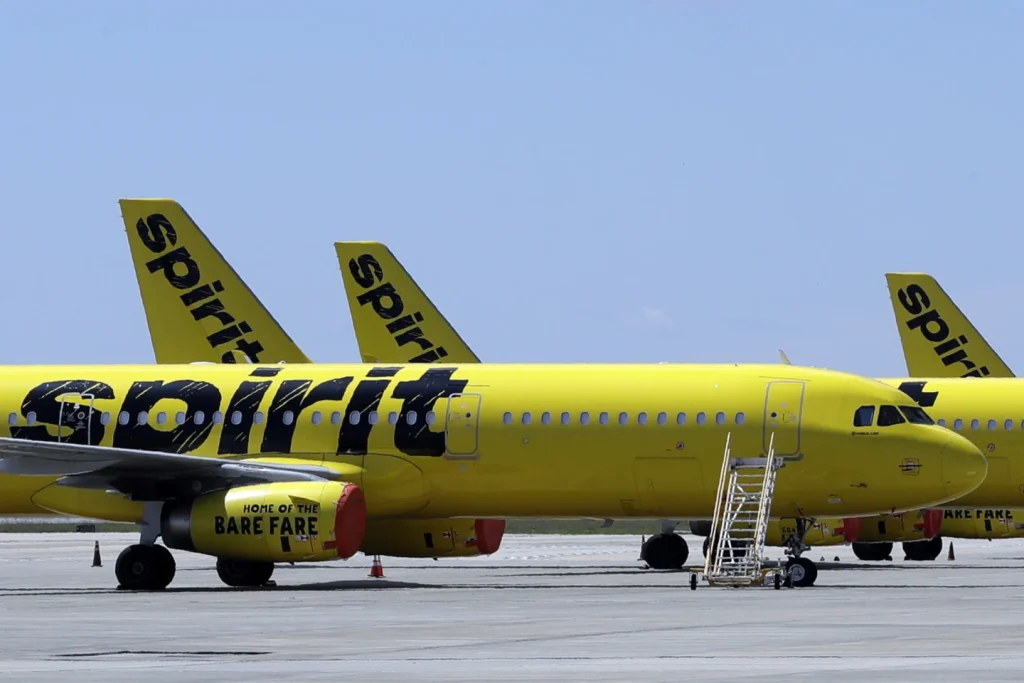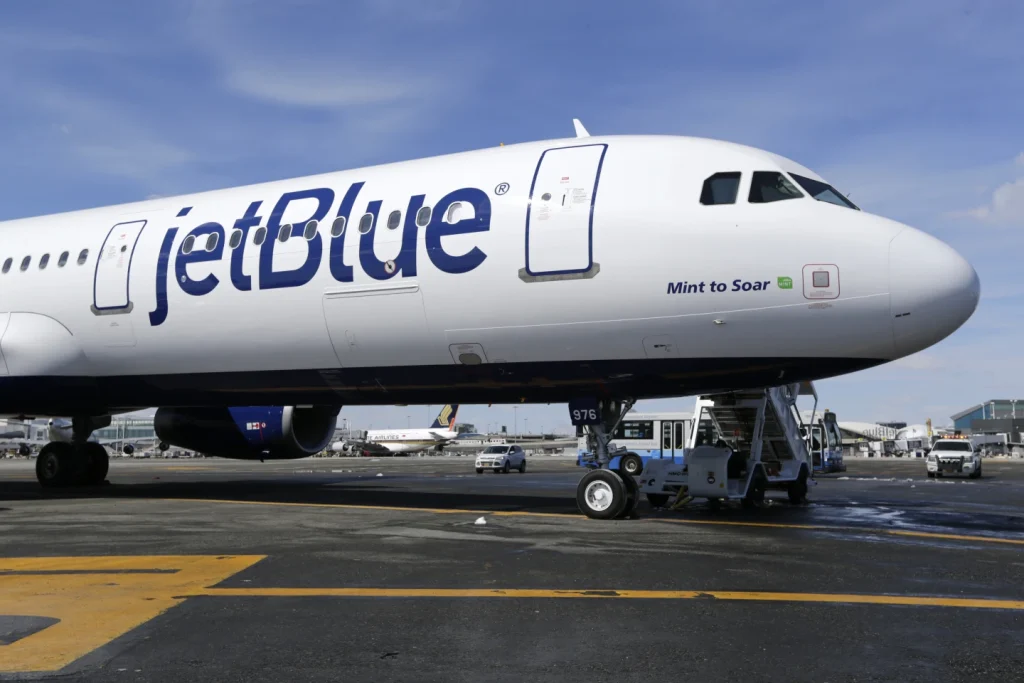In a recent development that has reverberated across the aviation industry, a federal judge has rendered a decision that will significantly shape the competitive landscape of the U.S. air-travel market.
The ruling, which favored the Biden administration’s stance, effectively blocked JetBlue Airways from acquiring Spirit Airlines, citing concerns over reduced competition and potential negative implications for consumers.
This $3.8 billion deal, if realized, would have reshaped the low-cost airline segment, prompting a contentious legal battle and igniting discussions about the broader implications for the industry and its patrons.
The Justice Department’s assertion that the merger would lead to increased fares and diminished options for consumers formed the crux of the legal confrontation.
The presiding U.S. District Judge William Young, after meticulously presiding over a non-jury trial, delivered a comprehensive ruling exceeding 100 pages.
In his verdict, Judge Young underscored the government’s argument that Spirit Airlines, as the nation’s largest low-cost carrier, holds a pivotal role in providing an alternative for travelers seeking affordable airfare amidst a landscape dominated by pricier alternatives. “Spirit is a small airline.
But there are those who love it,” the judge acknowledged, emphasizing the significance of Spirit’s unique value proposition to its loyal customer base.
Central to the judge’s decision was the recognition that while a potential JetBlue-Spirit partnership could introduce heightened competitive pressure on larger airlines, it could also detrimentally impact consumers reliant on Spirit’s distinctive, low-price business model.
This dualistic impact underscores the complexity of evaluating corporate mergers within the context of consumer welfare and market dynamics.
The immediate market response to the ruling, as evidenced by the sharp decline in Spirit Airlines’ stock value and the concurrent rise in JetBlue’s shares, reflects the far-reaching implications of this legal intervention on the financial and operational landscape of the involved entities.
JetBlue and Spirit Airlines have expressed their disagreement with the ruling and are deliberating the possibility of an appeal.
JetBlue, headquartered in New York, has vocally defended the necessity of the merger as a strategic imperative to foster its growth and enhance its competitive positioning vis-à-vis dominant industry players.
The airlines have underscored their commitment to expanding consumer choice and affordability, emphasizing the potential benefits that the merger could have brought to a broader consumer base.
This ruling represents a significant triumph for the Biden administration’s overarching strategy to curtail consolidation within various industries.
Attorney General Merrick Garland has lauded the decision as a victory for millions of air travelers, highlighting the potential adverse impact on fares and choices that could have materialized had the merger proceeded as planned.
The administration’s proactive stance against industry consolidation underscores a broader commitment to safeguarding consumer interests and preserving market competition.
The implications of this ruling extend beyond the immediate parties involved, resonating with broader discussions on antitrust regulations, corporate consolidation, and the delicate balance between fostering industry innovation and safeguarding consumer welfare.
While the decision has delivered a respite for proponents of market competition, it has also prompted introspection about the evolving dynamics of the aviation industry and the regulatory framework governing corporate consolidation.
In conclusion, the ruling to block the JetBlue-Spirit Airlines merger stands as a pivotal moment in the ongoing discourse on market competition and corporate consolidation within the U.S. air-travel industry.
It underscores the intricate interplay between corporate strategy, consumer welfare, and regulatory oversight, prompting stakeholders to reevaluate their approaches to industry consolidation and competitive dynamics.
As the legal proceedings unfold and the industry recalibrates in response to this landmark decision, the implications of this ruling will continue to reverberate across the aviation landscape, shaping the contours of market competition and consumer choice in the years to come.
JetBlue, a major player in the airline industry, has recently faced a series of setbacks in federal court, raising questions about its future growth and expansion plans.
This latest ruling marks the second significant blow for the company in less than a year, following a previous court decision that thwarted its partnership with American Airlines in the Northeast region.
As the nation’s sixth-largest airline in terms of revenue, JetBlue now finds itself in a challenging position, tasked with devising a new strategy for growth and development.
This responsibility falls on the shoulders of incoming CEO Joanna Geraghty, who is set to take over from Robin Hayes.
It is worth noting that Hayes had been instrumental in orchestrating the deals that have now been blocked in court, underscoring the magnitude of the obstacles facing the company.
The recent ruling has not only dealt a blow to JetBlue’s expansion plans, but it has also opened the door for potential competitors to capitalize on the situation.
Specifically, the decision could pave the way for Frontier Airlines to revisit its efforts to acquire Spirit Airlines.
It is worth recalling that both budget carriers had previously announced a cash-and-stock deal in 2022, only to have JetBlue swoop in with an all-cash offer, ultimately winning a bidding war for the Florida-based airline.
The thwarted acquisition of Spirit Airlines by JetBlue has been a contentious issue, with Spirit’s CEO and board initially opposing the sale.
Their concerns about the potential regulatory hurdles and the impact of eliminating a low-cost carrier from the U.S. market have proven to be prescient in light of the recent court rulings.
Notably, JetBlue had planned to rebrand Spirit’s planes and reconfigure their seating to align with its own standards, a move that has now been stymied by the legal challenges.
In light of these developments, it is evident that JetBlue faces a pivotal moment in its trajectory. The company must navigate the aftermath of these court rulings and chart a new course for its future growth.
This entails not only reassessing its expansion strategies but also reevaluating its approach to potential mergers and acquisitions in the fiercely competitive airline industry.
The implications of these setbacks extend beyond JetBlue’s immediate concerns, reverberating throughout the broader landscape of the airline industry.
The dynamics of competition, consolidation, and regulatory scrutiny are all underscored by these recent events, shaping the contours of the industry’s future landscape.
As such, the outcomes of these legal battles have far-reaching implications that transcend the individual companies involved, offering insights into the complex interplay of market forces and regulatory oversight.
Looking ahead, JetBlue will need to regroup and recalibrate its plans in response to these setbacks. The company’s ability to adapt and innovate in the face of adversity will be critical in determining its future trajectory.
Moreover, the broader industry will be closely watching how JetBlue navigates these challenges, as the company’s strategies and decisions are likely to have ripple effects across the airline sector.
In conclusion, JetBlue’s recent setbacks in federal court have cast a shadow over its growth prospects and strategic initiatives.
The company’s incoming CEO faces the daunting task of charting a new path forward in the wake of these legal challenges.

As the airline industry continues to evolve and confronts shifting market dynamics, the implications of these developments extend beyond JetBlue, offering valuable insights into the complex interplay of competition, regulation, and strategic decision-making.
The manner in which JetBlue responds to these setbacks will undoubtedly shape its future trajectory and influence the broader contours of the airline industry.
In the realm of corporate mergers and acquisitions, the interplay between business interests and regulatory oversight often leads to complex and contentious outcomes.
The recent saga involving JetBlue and Spirit Airlines stands as a compelling case study, shedding light on the delicate balance between market consolidation and antitrust enforcement.
The proposed merger between these two carriers faced significant resistance, ultimately culminating in a pivotal legal decision that has sparked widespread debate and speculation within the aviation industry and beyond.
The initial impetus for the merger lay in the mutual struggle of JetBlue and Spirit to rebound from the profound disruptions inflicted by the COVID-19 pandemic.
As the larger legacy carriers returned to profitability, the smaller airlines continued to grapple with substantial financial losses.
JetBlue, reeling from a staggering $2 billion in losses since the onset of the pandemic, sought to fortify its position by joining forces with Spirit, which itself had incurred over $1.6 billion in losses due to soaring costs and subdued demand.
The proposed merger, in essence, aimed to leverage synergies and scale up operations to effectively compete with the dominant players in the industry.
However, the merger faced formidable obstacles in the form of regulatory scrutiny. In a bid to assuage concerns and overcome resistance, JetBlue acceded to a reverse breakup fee of $70 million and committed to compensating Spirit shareholders with $400 million in the event of a deal failure stemming from government opposition.
Despite these concessions, the proposed merger encountered a significant setback when a judge ruled against it, prompting a wave of divergent reactions from industry experts and stakeholders.
Proponents of the merger, such as Jessica Melugin, an antitrust expert at the Competitive Enterprise Institute, lamented the ruling, arguing that thwarting the consolidation of smaller competitors hampers their ability to effectively challenge the industry’s dominant players.
The contention that such mergers are essential for bolstering competitiveness and consumer welfare underscored the criticism directed at the judicial decision.
Conversely, critics of airline mergers over the past decade, including William McGee of the American Economic Liberties Project, lauded the ruling as a triumph for antitrust enforcement and a safeguard for travelers, workers, and local communities.
The implications of this ruling extend beyond the confines of the JetBlue-Spirit saga, casting a shadow of uncertainty over future consolidation endeavors within the airline industry.
The government’s triumph in halting this merger could potentially embolden further challenges to proposed acquisitions, as evidenced by the speculation surrounding Alaska Airlines’ bid to acquire Hawaiian Airlines.
The reverberations of this ruling are poised to influence the trajectory of future merger attempts, with the specter of heightened antitrust scrutiny looming over prospective deals.
As the dust settles on the JetBlue-Spirit conundrum, the broader implications for the airline industry and antitrust enforcement remain a subject of fervent speculation.
The clash between the imperatives of market consolidation and the mandate of antitrust oversight underscores the intricate interplay between business strategy, regulatory intervention, and consumer welfare.
The ramifications of this ruling resonate far beyond the confines of the aviation sector, serving as a poignant reminder of the enduring tension between corporate ambitions and the imperative of preserving competitive markets.
In conclusion, the tumultuous trajectory of the JetBlue-Spirit merger encapsulates the intricate dynamics at play when business imperatives intersect with regulatory oversight.
The divergent perspectives surrounding the judicial ruling underscore the profound implications for the airline industry and the broader contours of antitrust enforcement.
As the specter of consolidation and regulatory scrutiny continues to shape the corporate landscape, the saga of JetBlue and Spirit stands as a compelling testament to the enduring complexities inherent in the pursuit of market consolidation and the preservation of competitive markets.
